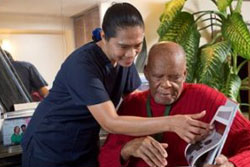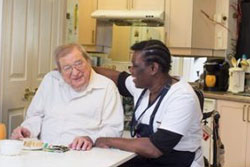PALLIATIVE CARE
Palliative CARE
The Palliative Care Journey
The palliative care journey shouldn’t be a lonely one. VHA is committed to being with you every step of the way, providing compassionate, professional care to people and their families living with a progressive, life-limiting illness such cancer, cardiopulmonary, kidney and/or neurological conditions. The support and expertise of the health team helps clients adjust and adapt to their circumstances as the illness progresses so they can receive medical and respite care as well as emotional and social support. Our palliative care team helps clients and families make informed choices to remain at home for as long as they choose and avoid unplanned admissions to hospital.
Frequently Asked Questions
- Do both the client (patient) and the family support the idea of death at home?
- Do you or your loved one have enough family or friend caregivers to manage the supports at home?
- Is skilled medical support available in your region 24 hours a day?
- Is the home equipped or able to be equipped to accommodate physical changes (e.g. wheelchair access, a bedroom on the main floor, room for medical equipment)?
- Do you or your family have the resources to facilitate a home death (e.g. changes to the house, extended time off work)?
- Is the family comfortable with health care providers, such as nurses, home care workers, and doctors, regularly coming into the home to help with caregiving?
- Palliative care at home: Many people would prefer to die in the comfort of their home. In Ontario, this is possible with palliative care support teams of nurses, home care workers, doctors and family/friends. Together with the patient, these teams work within the patient’s home to relieve suffering and improve quality of life and death.
- Palliative care in hospice: Sometimes a person can’t receive care in the home until their death. Hospice care provides palliative services within a medical residence. Any individual and/or family living with, or at risk of developing a life-limiting illness, regardless of their age can receive hospice care.
- Medical Assistance in Dying (MAiD): In June 2017, it became legal in Canada for doctors and nurse practitioners to provide patients with medical assistance in dying. This means that these medical professionals can administer a substance—or provide a substance for the patient to self-administer—that causes the patient’s death. Certain age and physical/mental health requirements must be met to be eligible. For more information visit the Government of Ontario website.
In Ontario, Local Health Integration Networks (LHINs) arrange all government-funded health care services for people living at home. LHINs are responsible for deciding who receives care, the level of care needed and for how long. Call 310-2222 to contact your region’s LHIN and find out what is available for your specific situation. Your palliative home care is likely to include home visits by physicians, nursing staff, personal-support workers, hospice volunteers, as well as support from your family and friends. Certain equipment and supplies may be provided through your LHIN if you are eligible.
In many cases, families pay for additional private home care support. Some of these services may be covered by private health insurance policies so check with your insurance provider to determine coverage (if applicable).
For those on a limited income, additional funding options for services and equipment may be available through government and charitable programs to eligible applicants.






